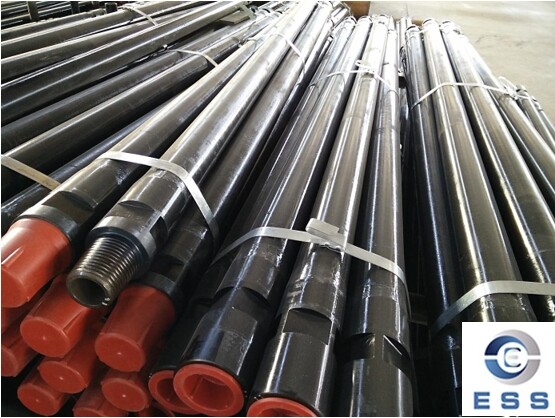
In harsh environments such as oil, gas and
water well drilling, the corrosion resistance of drill pipe is crucial. Drill pipes face a variety of corrosion risks in harsh
environments, including chemical corrosion, electrochemical corrosion, stress
corrosion cracking, etc. These corrosion problems may cause the strength of the
drill pipe to decrease, the service life to shorten, and even cause safety
accidents. Corrosion-resistant drill pipes can not only extend the service life
of the equipment, but also significantly improve drilling efficiency and reduce
maintenance costs.
Therefore, choosing drill pipe materials
and technologies with strong corrosion resistance is the key to ensuring the
success of drilling projects. Which corrosion-resistant drill pipes are
suitable for harsh environments?
Corrosion-resistant drill pipe materials
1. High alloy steel
High alloy steels (such as S135, V150)
significantly improve the corrosion resistance and strength of drill pipes by
adding alloying elements such as chromium, nickel, and molybdenum. These
materials perform well in high chloride ion environments, acidic environments,
and environments containing hydrogen sulfide (H₂S). For example, S135 drill pipe shows good corrosion resistance in
the corrosive environment of simulated wellhead, well and bottom of well.
2. Stainless steel
Stainless steel drill pipe has excellent
corrosion resistance and is particularly suitable for marine environment and
acidic well environment. The main components of stainless steel include iron,
chromium and nickel, and the dense chromium oxide film formed on its surface
can effectively prevent corrosion.
3. Composite materials
Composites (such as glass fiber reinforced
plastics) have natural corrosion resistance and are suitable for extreme
corrosive environments. These materials are not only corrosion-resistant, but
also have lower density and higher fatigue resistance. Composite materials also
perform well in the manufacture of hydraulic
tubes and precision tube,
which need to be used in high-pressure and highly corrosive environments.
Corrosion-resistant coating technology
1. Organic coating
Epoxy coating: Epoxy coating has good
chemical stability and wear resistance, and is suitable for the inner and outer
surfaces of drill pipes.
Polyurethane coating: Polyurethane coating
has excellent wear resistance and impact resistance, and is suitable for use in
harsh environments.
2. Inorganic coatings
Ceramic coatings: Ceramic coatings (such as
alumina, silicon nitride) have extremely high hardness and corrosion resistance
and are suitable for high temperature and high wear environments.
Zinc coating (galvanizing): Zinc coating
protects the drill pipe through sacrificial anodes to prevent corrosion.
3. Electroplating technology
Chrome plating: Chrome plating can
significantly improve the hardness and wear resistance of the drill pipe.
Nickel plating: Nickel plating has good
corrosion resistance and fatigue resistance.
Industry standards and certifications
When selecting corrosion-resistant drill
pipe, it is necessary to ensure that the product meets relevant industry
standards, such as API 5DP (drill pipe specification) and ISO 11960 (standard
for pipes for the oil and gas industry). These standards impose strict
requirements on the materials, manufacturing processes, test methods and
quality control of drill pipes to ensure the reliability of products in harsh
environments.
Summary
In harsh environments, choosing the right
corrosion-resistant drill pipe materials and coating technologies is the key to
ensuring the success of drilling projects. High alloy steel, stainless steel
and composite materials provide excellent corrosion resistance, while organic
coating, inorganic coating and electroplating technology further enhance the
protection of drill pipe. At the same time, products that meet industry
standards and certifications can provide higher reliability and safety. Through
reasonable maintenance and inspection measures, the service life of drill pipe
can be further extended and drilling efficiency can be improved.
Read more: Size of Drill Pipe or How Many Types of Drill Pipe Threads Are There?













 Eastern Steel Manufacturing Co.,Ltd not only improve product production and sales services, but also provide additional value-added services. As long as you need, we can complete your specific needs together.
Eastern Steel Manufacturing Co.,Ltd not only improve product production and sales services, but also provide additional value-added services. As long as you need, we can complete your specific needs together.










